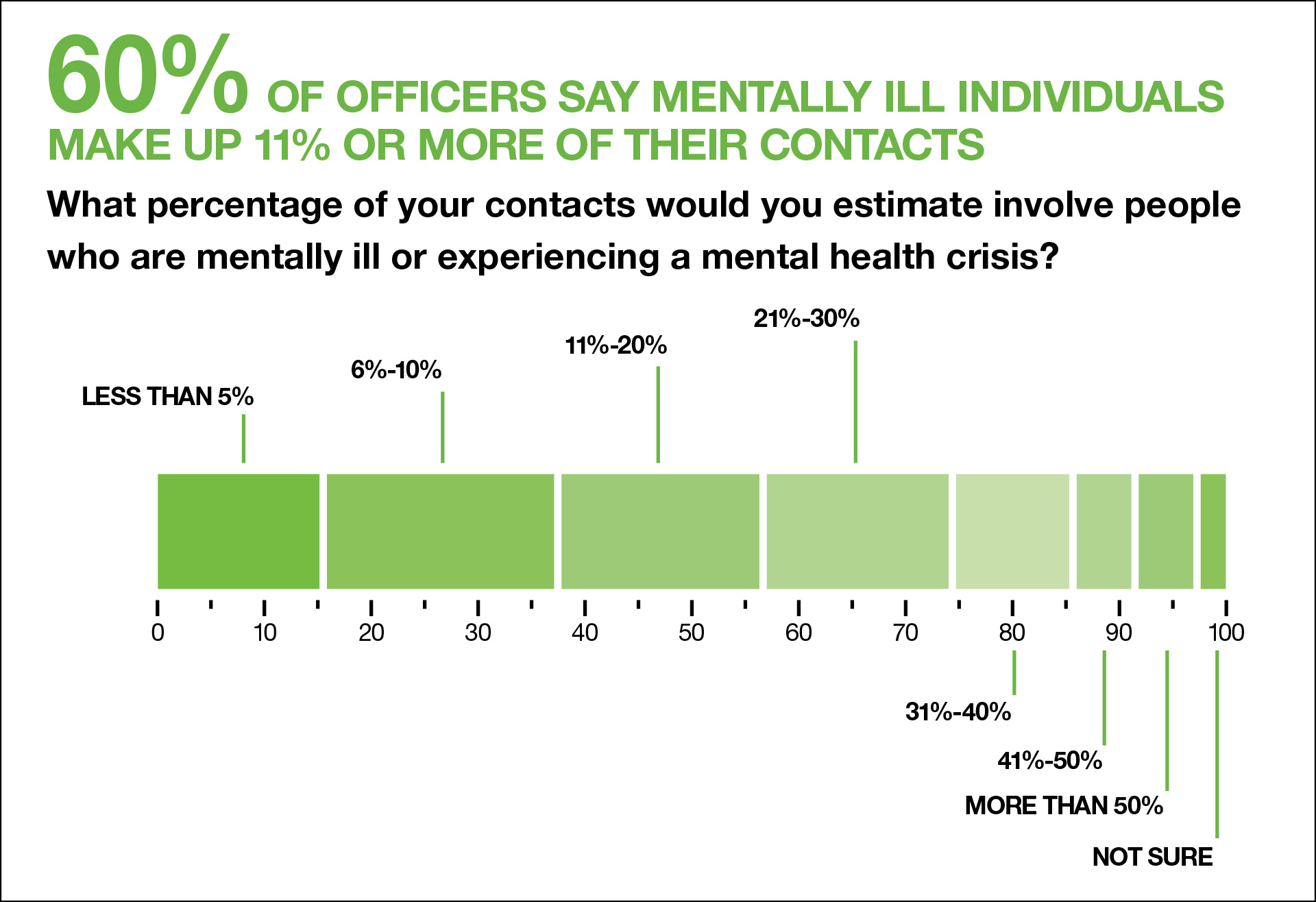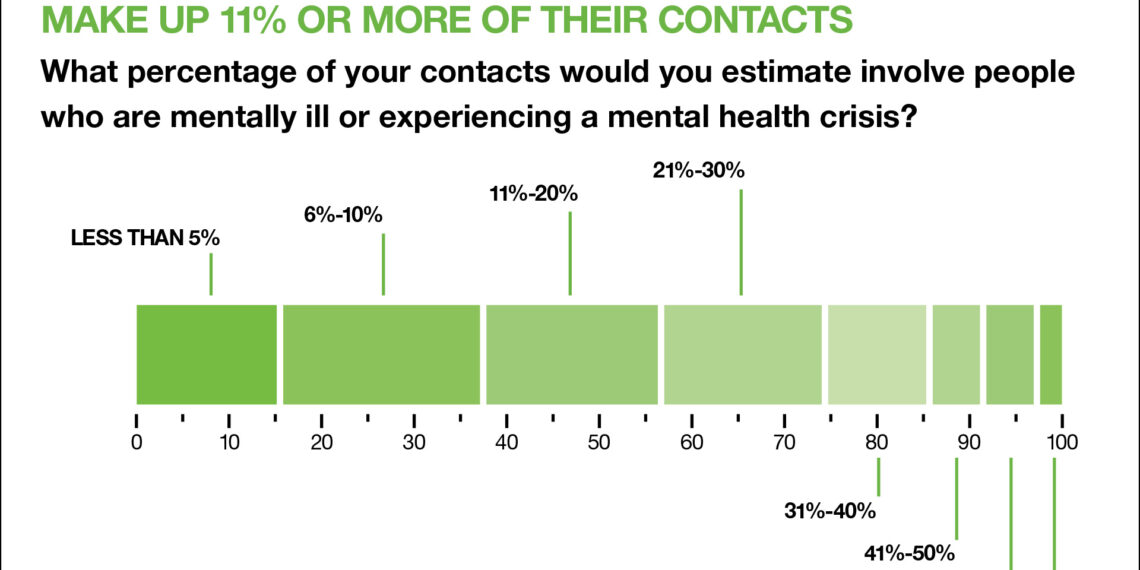[ad_1]

Police officers in a nationwide survey reported that over 11% of all police contacts involve mentally ill individuals. Mental health issues account for at least 1 in 4 and up to half of all fatal police shootings, according to a study by the Treatment Advocacy Center. “By dismantling the mental illness treatment system, we have turned the mental health crisis from a medical issue into a police matter,” said John Snook, executive director and a co-author of the study.
Currently, there are four models to deal with individuals in crisis:
- Patrol response: A traditional police patrol officer response with a focus on order maintenance that oftentimes focuses on keeping the peace, making an arrest or detaining a person who is a clear and present danger to themselves or others.
- Crisis intervention teams: Specially trained law enforcement officers respond to calls for service involving people having a mental health crisis and liaise with mental health providers. About 2,700 agencies in the U.S. have such teams, or about 15% of all police agencies.
- Co-responder teams (CRTs): Law enforcement officers or firefighters are paired with trained clinicians who, together, respond to emergency calls involving individuals experiencing a mental health crisis. There are only a fraction of CRTs operating.
- Mobile crisis teams (MCTs): Utilize community-based mental health professionals to respond to individuals experiencing mental health crises. These teams typically do not involve the police initially, though police can be called upon when appropriate. There are only a handful of MCTs in the U.S.
This article focuses on the CIT model (also known as the Memphis model, where it was birthed in 1988), which is a collaboration that includes specialist CIT-trained officers as a core element.
CIT is about diversion to the mental health care system. However, for that to occur during the initial response, there needs to be a local team approach to crisis intervention, and there must be resources to divert individuals away from a traditional arrest process.
Scope of the challenge
Nearly 44 million Americans experience mental illness each year. The National Alliance on Mental Illness (NAMI) estimates that two million people with mental illness are booked into jails each year. According to a nationwide survey of law enforcement officers conducted by Lexipol, nearly 40% of officers and 50% of chiefs and sheriffs report their agencies do not have specialized resources to respond to calls involving mentally ill individuals. In the same survey, 80% of officers responding cited repeat contact with the same individuals suffering a mental health crisis as a top officer safety concern. A revolving door without resolution faces many law enforcement agencies nationwide. A community-based and coordinated response is obviously needed.
According to NAMI National Director of Advocacy and Public Policy Angela Kimball, best practices for mental health crisis response systems involve good communication skills, which assist in de-escalating situations, reducing trauma and keeping people in crisis out of the justice system, if possible.
CIT training has become a common discussion in policing. Currently, some communities are in a tug of war, wanting to replace police response with social workers and counselors for any personal crisis call. Yet, most regions across the country still find that the police are often the only resource available to respond. The value of CIT is significantly reduced when communities do not have adequate mental health resources and refuse to properly fund what may be needed. States continue to underfund transitional in-patient resources and have differing standards, laws and paths for the mentally ill to follow to receive any service at all.
Law enforcement wants help
Most response calls involving people with mental illness are not the result of criminal behavior, but of emotional crisis. While law enforcement officers have the duty to arrest anyone who is breaking the law, it is critical for officers responding to mental health calls to adequately assess the situation and the support required so that a determination of appropriate action can be made in the best interest of the subject, the officer and the public.
The Lexipol survey revealed that 60% of officers say the ability to get specialized resources on the scene more quickly would help them feel better equipped to deal with calls involving people in crisis. Because police often lack the tools and training to address such concerns, these calls for service can result in use-of-force incidents, justice system involvement and other adverse outcomes for civilians, as well as put a strain on public safety resources.
The firehouse model and others that think beyond the police
Looking beyond a traditional police response is critical for the future. One such option involves fire departments responding to behavioral health emergencies instead of the police. Decades ago, as fire calls dropped, the fire service embraced emergency medical response as a core function. People in crisis are a health-based emergency and are not usually a criminal incident requiring the police.
One size will not fit every community. Some fire departments are strictly volunteer operations. Others in metropolitan areas already face huge call load challenges. But many firefighters are already emergency medical responders (EMRs) or emergency medical technicians (EMTs).
Crisis Assistance Helping Out On The Streets (CAHOOTS) was founded in Eugene, Oregon, 30 years ago. This is a mobile crisis intervention response team tied directly to the area’s 9-1-1 system. Two-person teams provide crisis intervention, counseling, basic emergency medical care, transportation and referrals to services. CAHOOTS responds to over 18,000 calls annually, or 17% of all 9-1-1 calls for service.
The Crisis Response Unit (CRU) in Olympia, Washington, launched in April 2019, and Denver’s Support Team Assistance Response (STAR) program started in June 2020. Both use two-person teams. CRU and STAR have responded to thousands of calls related to mental health, poverty, homelessness and substance use.
San Francisco’s Street Crisis Response Team (SCRT) was started as a pilot program in November 2020. It sends out three-person teams, made up of a social worker, a paramedic and a peer specialist with lived experience — someone who may be able to better relate to people in crisis.
Training
The question remains, shouldn’t all officers be trained in the 40-hour CIT course? The research says no. The International Association of Chiefs of Police (IACP) says no, as does the Department of Justice.
The information, tactics and techniques taught in the 40-hour CIT course are advanced and require experienced learners who are motivated to engage with the material and take on the specialist CIT role. Many officers are not ready nor interested, or do not have the disposition to fully engage in this advanced specialist training.
Just as many officers are not cut out to be a K-9 handler, bomb tech, SWAT or dive team officer, not all officers are cut out to be or are interested in taking on the CIT officer’s leadership role.
There is a growing number of training models to provide basic mental health awareness and de-escalation training for all officers. All law enforcement officers need robust training that supports basic competencies in recognizing and responding to mental health crises.
One approach is called mental health first aid, an eight-hour course that teaches officers how to identify, understand and respond to signs of addiction and mental illness, and apply a five-step action plan to help. The IACP launched the One Mind Campaign in 2016 with the goal of training 100% of sworn officers and selected non-sworn staff, including dispatchers, in mental health first aid (mentalhealthfirstaid.org).
Mental illness and people in crisis exist in all communities, and it is not a crime. It is incumbent that police agencies and communities collaborate to address, respond to and seek new funding for sustainable mental health responses and services for those in need.
As seen in the May 2023 issue of American Police Beat magazine.
Don’t miss out on another issue today! Click below:
[ad_2]





